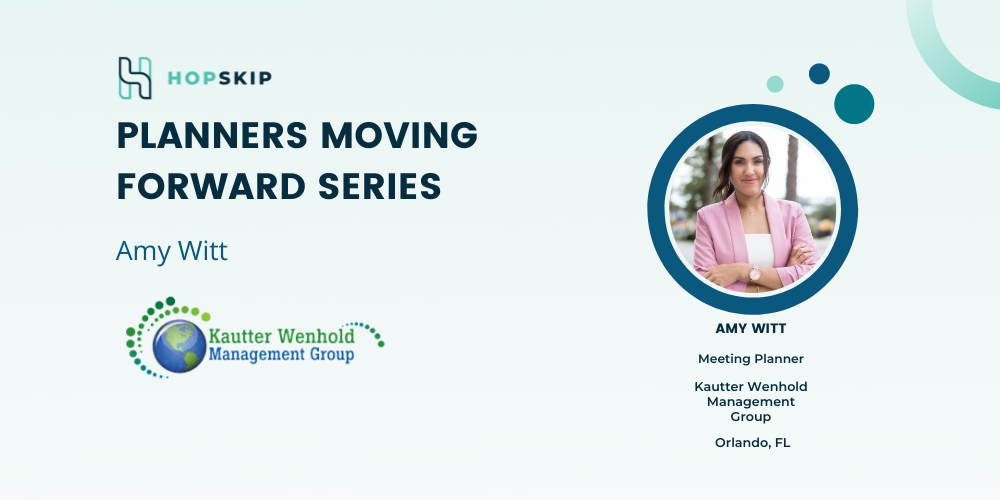This post is part of the HopSkip Planner Spotlight Series where HopSkip spotlight's planners across the industry to bring awareness of how they adapted to COVID-19, communicating and lessons learned and sharing how they are viewing the meetings and events industry in a post-pandemic world.
Name: Amy Witt
Company Name: Kautter Wenhold Management Group
Job Title: Meeting Planner
Years of Experience: 9
How do you think you are positioned, after months of persevering with the pandemic, to take advantage of our new and disrupted meetings/events landscape?
After nearly two years of virtual events, our attendees are more eager than ever to meet in person! Planners are coming back to in-person meetings with a fresher perspective than before and now is our opportunity to improve processes we may not have looked at before. We certainly expect in-person meeting attendance to increase in 2022.
As our community moves forward with planning in person meetings, what new technologies or processes are you implementing that you may have not looked at before?
In 2021, we planned for several in-person meetings that ultimately turned into a virtual event. As we prep for 2022, we are setting up registration pages to make this transition easier just in case, to avoid a last-minute scramble. QR codes and mobile apps are a must for events in 2022.
As we see virtual meetings transition back to face to face, hybrid meetings are beginning to be the vehicle to return to normalcy. What are your thoughts on hybrid meetings versus traditional fully in person meetings?
Hybrid meetings are great in theory for groups that have the budget and staffing to accommodate, but I think it is important before planning a hybrid meeting to consider the extra cost and time associated with adding this element. Attendees are likely to expect this option as we move forward, so staff should be ready to explain why a hybrid option may not be available, or the extent of the hybrid offering. Planners have to consider
In your opinion, what do you think the biggest value for your attendees is in regards to returning to live events?
Networking! I think meeting planners and attendees can all agree, a virtual happy hour just isn't the same. The value of meeting people in your industry in-person is unparalleled. It has been impossible to recreate the buzz of the exhibit hall and a reception within a virtual platform. Interactive sessions and workshops can only go so far online. Location will be extremely important as well to draw attendees back to live meetings.
As the pandemic fades away and we return to face-to-face events what do you hope changes, either for planners or hoteliers, in the traditional RFP and proposal process as a result of all of the learnings from the last 20+ months?
It would be great if hotels could be a little more flexible! In 2021 as we transitioned to virtual events, we learned that hotels were not always willing to work with groups that were forced to go virtual. If the group is offering to rebook a future year and have the hotel keep the deposit already on file, it is unfortunate when the hotel won't meet us in the middle. Planners should definitely be more specific in force majeure and cancellation clauses.
This post is part of the HopSkip Planner Spotlight Series where HopSkip spotlight's planners across the industry to bring awareness of how they adapted to COVID-19, communicating and lessons learned and sharing how they are viewing the meetings and events industry in a post-pandemic world.
